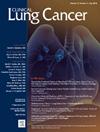Patients With Advanced Non–small Cell Lung Cancer Harboring MET Alterations: A Descriptive Cohort Study
IF 3.3
3区 医学
Q2 ONCOLOGY
引用次数: 0
Abstract
Purpose
Mesenchymal–epithelial transition factor (MET) alterations are rare oncogenic drivers in patients with non–small cell lung cancer (NSCLC). This study characterized patients with advanced NSCLC harboring MET exon 14 (METex14) skipping and MET amplification (METamp) in routine clinical practice in the United States.
Patients and Methods
Using electronic medical record data from the ConcertAI Oncology Dataset (2004-2022), 2 patient cohorts were identified: 1 with METex14 skipping with or without METamp, and 1 with METamp without METex14 skipping. A subgroup with METamp and concomitant epidermal growth factor receptor (EGFR) mutations who had received EGFR-tyrosine kinase inhibitors (TKIs) was also analyzed. Patient characteristics, treatment patterns and outcomes were described.
Results
93 patients with advanced NSCLC harboring METex14 skipping and 164 with advanced NSCLC harboring METamp were identified. Established oncogenic drivers other than MET were less frequent in the METex14 skipping cohort than the METamp cohort. In both cohorts, first-line chemotherapy use decreased over time while immune checkpoint inhibitor (ICI) and MET inhibitor use increased. Treatment patterns were heterogeneous, with patients receiving multiple drug classes across therapy lines. Outcomes were better for patients with METex14 skipping NSCLC who received targeted therapies or ICIs versus chemotherapy. Subgroup analyses of EGFR-TKI-treated patients with METamp indicated poor outcomes.
Conclusion
Patients with METex14 skipping and/or METamp NSCLC require targeted and personalized treatment approaches to optimize treatment effect and have an unmet medical need. With targeted therapies recently available and others under exploration, treatment outcomes could significantly improve for patients with NSCLC harboring these rare drivers.
伴有MET改变的晚期非小细胞肺癌患者:一项描述性队列研究
目的:间充质上皮转化因子(MET)改变在非小细胞肺癌(NSCLC)患者中是罕见的致癌驱动因素。这项研究在美国的常规临床实践中描述了MET外显子14 (METex14)跳跃和MET扩增(METamp)的晚期NSCLC患者。患者和方法:使用ConcertAI肿瘤学数据集(2004-2022)的电子病历数据,确定了2个患者队列:1个患者在使用或不使用METamp时存在METex14跳过,1个患者在使用METamp时没有METex14跳过。研究还分析了METamp和伴随表皮生长因子受体(EGFR)突变的接受EGFR-酪氨酸激酶抑制剂(TKIs)治疗的亚组。描述了患者特征、治疗模式和结果。结果:93例晚期NSCLC伴有METex14跳脱,164例晚期NSCLC伴有METamp。在METex14跳过队列中,除MET之外的已确定的致癌驱动因素比METamp队列更少。在这两个队列中,随着时间的推移,一线化疗的使用减少,而免疫检查点抑制剂(ICI)和MET抑制剂的使用增加。治疗模式是异质性的,患者在治疗线上接受多种药物类别。与化疗相比,METex14跳过非小细胞肺癌患者接受靶向治疗或ICIs的结果更好。经egfr - tki治疗的METamp患者的亚组分析显示预后较差。结论:METex14跳过和/或METamp非小细胞肺癌患者需要有针对性和个性化的治疗方法来优化治疗效果,并且存在未满足的医疗需求。随着靶向治疗的出现和其他治疗方法的探索,具有这些罕见驱动因素的非小细胞肺癌患者的治疗结果可能会显著改善。
本文章由计算机程序翻译,如有差异,请以英文原文为准。
求助全文
约1分钟内获得全文
求助全文
来源期刊

Clinical lung cancer
医学-肿瘤学
CiteScore
7.00
自引率
2.80%
发文量
159
审稿时长
24 days
期刊介绍:
Clinical Lung Cancer is a peer-reviewed bimonthly journal that publishes original articles describing various aspects of clinical and translational research of lung cancer. Clinical Lung Cancer is devoted to articles on detection, diagnosis, prevention, and treatment of lung cancer. The main emphasis is on recent scientific developments in all areas related to lung cancer. Specific areas of interest include clinical research and mechanistic approaches; drug sensitivity and resistance; gene and antisense therapy; pathology, markers, and prognostic indicators; chemoprevention strategies; multimodality therapy; and integration of various approaches.
 求助内容:
求助内容: 应助结果提醒方式:
应助结果提醒方式:


